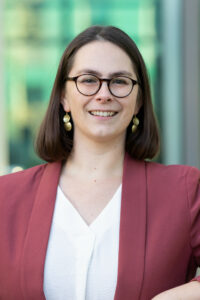Briegleb, Annika
Briegleb, Annika
My research focuses on audio signal enhancement in various situations, including robot audition. I predominantly work on machine learning-based methods and also investigate combinations of model- and data-driven approaches.
Master theses:
- Complex-valued Variational Autoencoder for Speech Enhancement (2023)
- Dual-staging in speech enhancement: An analysis of cost function modalities (2022)
- Complex-valued Variational Autoencoder for Speech Enhancement (2022)
- Exploring Attention Models for Speech Enhancement (2021)
- Acoustic Source Separation based on Deep Clustering and Independent Component Analysis (2021)
- An Evaluation of the Perception-based Loss for Speech Enhancement (2021)
- A Denoising Autoencoder for Speech Enhancement (2020)
- Deep Attractor Networks for single-channel ego-noise reduction in robot audition (20
Bachelor theses:
- Analysis of RNN features in spatiospectral filtering (2024)
- Investigation of the STFT in the context of neural network-based speech enhancement (2022)
- Attention Models for Speech Processing (2020)
Research projects/internships:
- Deep learning-based spatial filtering for audio processing (2023)
- Effect of a 3D convolutional layer on multichannel speech enhancement (2023)
- Influence of training target on spatial filtering behavior in multichannel speech enhancement (2023)
- Experimental study on performance variability in neural networks due to hardware and software involved in training (2022)
- Postprocessing for mask-based speech enhancement (2022)
- Evaluation of cost functions for neural network-based postfiltering in acoustic echo cancellation (2021)
- An end-to-end ASR system for speech enhancement (2021)
- Learning a Transformation for Audio Signal Representation (2021)
- Evaluation of Deep Clustering for discriminating various types of robotic ego-noise (2020)
- Hyperparameter adaptation for Deep Clustering for ego-noise suppression (2020)
2025
- :
3MT Competition (EUSIPCO2024): A peek into the black box: Insights into the functionality of complex-valued neural networks for multichannel speech enhancement
In: Science Talks 13 (2025), Article No.: 100430
ISSN: 2772-5693
DOI: 10.1016/j.sctalk.2025.100430
BibTeX: Download
2024
- , :
Analysis of spatial filtering in neural spatiospectral filters and its dependence on training target characteristics
In: EURASIP Journal on Audio, Speech, and Music Processing 61 (2024)
ISSN: 1687-4714
DOI: 10.1186/s13636-024-00381-3
URL: https://link.springer.com/article/10.1186/s13636-024-00381-3
BibTeX: Download - , :
Spatially Constrained vs. Unconstrained Filtering in Neural Spatiospectral Filters for Multichannel Speech Enhancement
2024 32nd European Signal Processing Conference (EUSIPCO) (Lyon, France, 26. August 2024 - 30. August 2024)
In: European Association for Signal Processing (EURASIP) (ed.): 2024 32nd European Signal Processing Conference (EUSIPCO) 2024
DOI: 10.48550/arXiv.2406.11376
URL: https://ieeexplore.ieee.org/document/10715258
BibTeX: Download
2023
- , , :
Exploiting spatial information with the informed complex-valued spatial autoencoder for target speaker extraction
2023 IEEE International Conference on Acoustics, Speech and Signal Processing (ICASSP) (Rhodes, Greece, 4. June 2023 - 10. June 2023)
DOI: 10.1109/ICASSP49357.2023.10095196
URL: https://ieeexplore.ieee.org/document/10095196
BibTeX: Download - , , , :
Localizing Spatial Information in Neural Spatiospectral Filters
2023 31st European Signal Processing Conference (EUSIPCO) (Helsinki, Finland, 4. September 2023 - 8. September 2023)
DOI: 10.23919/EUSIPCO58844.2023.10289820
URL: https://ieeexplore.ieee.org/document/10289820
BibTeX: Download
2022
- , :
Statistical Analysis of Randomness in Training of Small-Scale Neural Networks for Speech Enhancement
2022 International Workshop on Acoustic Signal Enhancement (IWAENC) (Bamberg, 5. September 2022 - 8. September 2022)
DOI: 10.1109/IWAENC53105.2022.9914739
URL: https://ieeexplore.ieee.org/document/9914739
BibTeX: Download
2021
- , , , , :
Combining Adaptive Filtering and Complex-valued Deep Postfiltering for Acoustic Echo Cancellation
IEEE International Conference on Acoustics, Speech and Signal Processing (ICASSP) (Toronto, 6. June 2021 - 11. June 2021)
In: IEEE International Conference on Acoustics, Speech and Signal Processing (ICASSP) 2021
DOI: 10.1109/ICASSP39728.2021.9414868
BibTeX: Download
2019
- , , :
Deep Clustering for single-channel ego-noise suppression
International Congress on Acoustics (ICA) (Aachen, 9. September 2019 - 13. September 2019)
URL: https://pub.dega-akustik.de/ICA2019/data/articles/000705.pdf
BibTeX: Download

